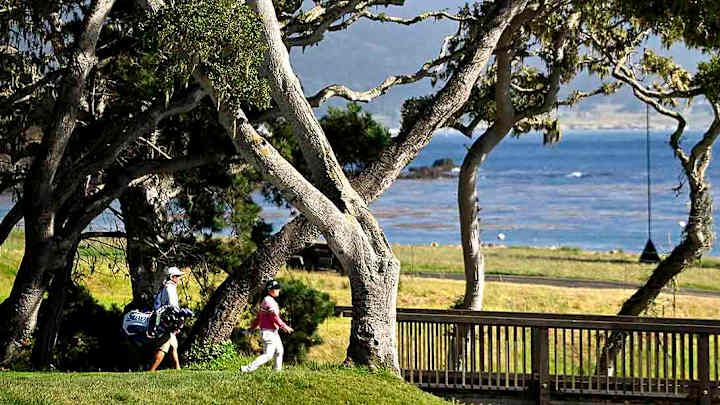NBC's U.S. Women's Open Broadcast Was Hardly Flawless, But Morgan Pressel Shined in Prime Time

Is there any rational explanation as to why it took until 2023 for a U.S. Women’s Open to be held at Pebble Beach? For all the well-intended fawning over the beauty of the grounds and competitive dynamics of the most spectacular seaside landscape in American golf, the USGA doesn’t deserve a slap on the back for hosting the world’s best female players at such an iconic, public-access venue 30 years later than logic suggests.
A kick in the pants would be more appropriate. The sport’s old-world roots continue to account for the grass on which the game’s biggest events are played. In this case, what might be considered water under the bridge to some is a river running uphill to others. The ladies still take what they can get. When they can get it.
Pebble Beach’s July debut indeed offered unprecedented visibility for women’s golf: four nights of prime-time air on a major network (NBC), mainstream exposure that can’t be measured so much as it should be appreciated. Early-round audiences dwarfed the sizes of those that watched the tournament last year—and surely attracted more weekend viewers than the LIV Golf telecasts from London, at least until the league’s Saudi-subsidized communications department applies its own special touch to those paltry numbers.
Suffice it to say this wasn’t a mainstream-friendly women’s major, if there is such a thing. The 54-hole leaderboard was stacked with relative anonymity, leading to a first-time LPGA winner (Allisen Corpuz) who coasted to victory without any resistance down the stretch. Corpuz’s impressive performance took NBC right to the doorstep of “America’s Got Talent” in the Eastern and Central time zones, so maybe a few thousand young girls around the country found inspiration in watching a 25-year-old Hawaiian playing excellent golf on such a lovely piece of land.
Then again, they might have gone back to guzzling cellular data until Howie Mandel arrived.
Working her third U.S. Women’s Open as NBC’s lead analyst, Morgan Pressel continued her climb toward high-end credibility, sounding very little like the raw, overwhelmed, apologetically dependent ex-player who was thrown into the deep end too soon. The last thing the LPGA needs is a housegal; Pressel was opinionated as a tour pro and has successfully transferred that trait to the booth.
“Dare I say, [this] is the biggest and most important women’s golf event ever to be held,” she declared during Saturday’s third round. Late Sunday, Pressel took viewers to the intersection of Truth & Dare once again: “I think back to the times I’ve seen [Corpuz] in the past year or so, in contention, and she just hasn’t really had it, especially with the putter. But today, the clutch putts on 14 and 15, those are the type of putts that win U.S. Opens.”
OK, so Ben Wright might have phrased it more eloquently, but Pressel is still very young as an analyst, and she has demonstrated enough skill to assess her post-playing career as one with a high ceiling. In a job that requires a steady balance of verve and nerve, she’s on the right track. She has come a thousand miles from her doe-in-the-headlights description of Lexi Thompson’s final-nine meltdown at the 2021 U.S. Women’s Open, where Pressel’s perspective came across as far too emotionally attached and lacked any form of substance altogether.
It was her fourth event as an announcer, and she wasn’t close to capable of calling a train wreck. “I’ve learned [more] from that week than anything else I’ve done in television, and it was hard,” Pressel recently told Golf Digest. Honesty isn’t just the best policy. It’s the highest form of responsibility.
She has since taken a deep dive into the nuances and non-negotiable necessities that make for quality analysis. Pressel was exceptionally well-prepared for the lengthy blocks of airtime she filled at Pebble Beach—anyone watching the weekend telecasts must have fallen asleep on the couch not to notice. Her course knowledge was almost encyclopedic, allowing her to dispense strategical bits relevant to the contest itself throughout the final round. Pressel is no Peter Kostis when it comes to breaking down golf swings, but nobody is, which underscores the need for NBC to hire an authoritative source to take advantage of that super-duper-mega-slo-mo camera it bought to provide visual detail on how the world’s top players dispatch their golf ball.
So with that lame attempt at a segue, this wasn’t a flawless telecast by any means. It took forever for NBC to tell viewers that 36-hole leader Bailey Tardy needed to keep her chin up and finish as high as she could to secure LPGA membership for 2024, which Tom Abbott did, which is not unusual. Abbott’s consistency and knack for relaying pertinent information are crucial to the presentation of women’s golf—he spends more time covering the LPGA than anybody and has for years. Overall, the use of statistical data didn’t come close to matching the highly effective deluge from the men’s U.S. Open three weeks ago, which one might expect from a Tour that still suffers from the lack of a comprehensive numerical resource.
Pressel’s finest moment came when she provided details of a 2004 car accident that killed Jiyai Shin’s mother and seriously injured both Shin, who was 16 at the time, and her brother. Perhaps the tragedy is common knowledge among those directly associated with the LPGA and those who follow the tour regularly, but when the U.S. Women’s Open is running in prime time on NBC and the same 16-year-old girl in that car is on the first page of the leaderboard 19 years later, the story has to be told again.
Morgan Pressel did that. She did it quite well.
